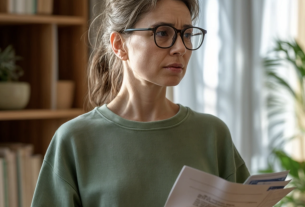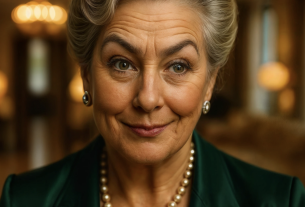“— Olechka, you can’t do that—she’s your own mother, after all…”
“— Mother?! That word doesn’t suit her at all! Please remember this: I don’t have a mother. I don’t. She died in childbirth.”
“— Olya…” gasped Sofya Borisovna. “What terrible things you’re saying!”
But Olya was already striding into the hall to go home. She hurriedly tied her scarf and tried to zip up her jacket. Her hands were shaking, and the zipper just wouldn’t catch. Sofya Borisovna watched her granddaughter and wiped the tears running down her cheeks. What could she do? You can’t bring the past back…
“— Get away, brat, get away! You’ve ruined my whole life,” Valya muttered sullenly, pushing away the thin little hands of her daughter, who clung to her like a drowning person to a straw. “I’m leaving anyway—cry or don’t cry, it won’t change a thing.”
Six-year-old Olya was in hysterics. She was terrified to be at home alone. Especially at night. But her mother didn’t care. She didn’t care about anything except drinking. And love. Not long ago she’d had love. Aleksandr… Sasha… The memory warmed Valya for a moment, but not for long. Her brain quickly dragged her back to reality: he was gone. Her beloved man had been killed in a drunken brawl. Of course. The circumstances of his death could hardly have been any different. His whole life was one long fight; he was hot-tempered and had even done time for once losing control and badly beating a man—his co-worker. He worked as a mechanic at an auto shop.
After six months in prison he couldn’t find a job for a long time, and it was during that rough patch that Aleksandr met Valya. She took him in and gave him warmth. Before that, Aleksandr had lived in a room in a dormitory—hardly the conditions Valya had, living with her mother in a three-room apartment with separate bedrooms and a big kitchen—so he decided not to miss his chance.
A couple of months later they got married. Valya worked as a cashier at a building-supply hypermarket, and they hired Sasha there as a janitor on a floor-scrubbing machine. For a short while their life settled down, and the couple had a daughter, Olya…
Olya’s earliest childhood memory was her mother fighting with Grandma, who wouldn’t let her go off on yet another drinking spree.
Olya squeezed her eyes shut in terror and covered them with her hands when her mother raised a fist over Grandma’s head. Then came thuds, a crash, a scream, and finally the loud slam of the front door. Her mother had left after all.
Peeking out from behind the fridge where she’d been hiding in the kitchen, Olya opened her eyes and saw Grandma sitting on a stool, pressing a pack of butter from the freezer to her cheek, where a bruise was rapidly spreading. Grandma was crying and lamenting:
“— How shameful! Your own daughter raising a hand against her mother… What have I lived to see…”
Seeing trembling little Olya tiptoe out from behind the fridge and come toward her, Sofya Borisovna set the butter aside and hugged her granddaughter tight.
Olya felt sorry for Grandma and stroked her warm side. And she also thought how good it was that her mother had gone out—now she wouldn’t hit anyone else.
But her mother did come back, late in the evening, as always. She didn’t start swinging again, though, because Sofya Borisovna had threatened to throw her out and change the locks if anything like that ever happened again. Ever since Aleksandr’s death, Valya had flown off the handle. She began drinking heavily, disappearing from home, and sometimes even skipping work.
Sofya Borisovna worked as a dispatcher on a rotational schedule. She lived at home only two weeks a month. The other two weeks she spent in a neighboring city. It was during one of those absences that Valya first brought Aleksandr into the house.
With each departure, Sofya worried more and more about her granddaughter. The preschool teacher had already twice threatened to report them to child services when Sofya was away and Olya stayed at the preschool until very late. Only after a phone call would Valya show up for her daughter—not entirely sober. In the morning, though, she would bring the girl to preschool at eight o’clock sharp, sober but a bit rumpled. The teacher had also once overheard Valya telling Olya that the child had tied her hands, that she couldn’t get free because of her, and that it would be better if the girl didn’t exist at all.
Once, when Sofya was home—she had just returned from a rotation—Valya threw a drunken tantrum that ended with shocking news for her mother.
“— They fired me, yeah…” Valya said, smearing drunken tears across her face. “For nothing. So I missed a couple of shifts… Lenka covered for me—who did that hurt? No, they yelled, ‘Get out, we won’t tolerate you anymore.’ And nobody cares that I’m traumatized! My beloved husband died! I can’t work, everything’s falling out of my hands, my soul hurts… I’ve lost the meaning of life! Only when I drink do I feel better… It’s an anesthetic for my soul, get it?!”
Valya sat on the couch and sobbed.
“— You have a daughter! There’s your meaning,” said Sofya.
“— I hate her! What do I need her for? She doesn’t even look like Sasha at all! You have to fuss with her all the time! I don’t want to! It makes me sick… I rush her off to preschool so I don’t have to see her. And on my day off… u-u-u! I’d throttle her!”
Sofya shook her head in grief and thought how good it was that Olya was at preschool and couldn’t hear what her mother was saying about her. Suddenly Valya wiped her tears and, hiccupping, said quite soberly:
“— I took out loans, Ma—I don’t know how I’ll pay them back. I haven’t worked in a long time… I just didn’t tell you. Sasha’s friends gave me an address. I went to some man’s place. I was supposed to quietly tidy up a house and feed a cat while the owner was away—the guy traveled a lot on business. He lived alone. Only I wasn’t doing it for the job. I needed to take some pictures of certain things in that house… What things? Doesn’t matter. You don’t need to know. I took the shots, but they didn’t pay me, and they even threatened that if I blabbed, they’d turn me in, since plenty of people had seen me there. And then the blackmail started. Some guy called and said he knew who was involved in the murder of that business traveler with the cat—hinted at me—threatened to tell the investigators… He demanded a crazy sum. I went and took out loans at two banks at insane interest, barely enough to pay off the extortionist. And then I found out by chance that the guy I went to wasn’t killed at all—on the contrary, he’s in a pretrial detention center now; he was mixed up in shady dealings, and the one who hired me must have been digging under him. And they just took money off me, the fool…”
Sofya froze, mouth open.
“— How much do you owe now?”
“— A lot…” Valya said quietly, and started wailing again. Then she fell at her mother’s feet and swore she’d stop drinking. She’d work to pay off the debts. She begged her mother to help her do it.
They had nothing to sell except the apartment. Sofya secretly rejoiced that her daughter owned only half of it, and Valya could put up her share as collateral only with Sofya’s consent.
Sofya made a decision: she took a second rotational job (she’d been offered it long ago), arranging the schedule so she’d spend two weeks at one job and two weeks at the other. She made her daughter promise to get a job, not abandon little Olya, not mistreat her, and take proper care of her.
After Sofya left, Valya quieted down for a while. She got hired as a head cashier at the supermarket near their home and almost stopped drinking. Almost. It didn’t last long, and soon she went off the deep end again. She quit her job and began going out in the evenings, sometimes for several days.
Olya—who was to start school the next year—clung to her mother, trying to keep her from leaving, but Valya was completely indifferent to her pleas and tears. After the girl, for the first time, went to bed alone without waiting for her mother and didn’t close her eyes all night from fear—hearing and imagining things despite leaving all the lights on—her worst nightmare became being left alone at night…
The preschool teacher did report them to child services after all, when Olya stopped showing up entirely, and when she called Valya and heard only inarticulate grunting in response.
The neighbors confirmed that the girl was often alone for long stretches, and that sometimes disreputable people were in the apartment, making noise late and disturbing the peace.
Olya was sent to a children’s home.
Life in the children’s home wasn’t bad for her. At last the girl stopped living in constant dread of what her mother would do next and even calmed down a bit; she started sleeping at night and eating again. Until recently, constant nerves had made it hard for her to swallow anything. She missed her grandmother very much, though. When she learned her granddaughter had been placed in a children’s home, Sofya managed to get time off work and came to see her immediately.
Sofya explained that she couldn’t take Olya in yet—even if she quit the second job, she was still home only half the month. And the loans still had to be paid off for a long time.
Sofya thought that, given their situation, the children’s home might indeed be better for her granddaughter.
When Olya was in fifth grade, Grandma finally took her in and formalized guardianship: Sofya retired, settled at home, and lived alone.
By then they had paid off the loans, and Valya—who, heeding her mother’s pleas, did in fact stop drinking—immediately moved in with some man.
“— Another thief and swindler,” Sofya grumbled to herself. “You can tell by his face. What does she see in them? Is she looking for men like Sasha, poor thing…”
She didn’t have to lay eyes on that swindler—or on Valya herself. Her daughter disappeared for many, many years. Once she wrote to her mother that she was fine, living with a man without registering the marriage, and that she still didn’t want to know Olya—nothing had changed.
Time passed; Grandma kept raising Olya. The girl asked about her mother only once, at twelve. When she learned her mother was alive and well, living somewhere far away and didn’t want to see her, she shut down and cried all night. Sofya had decided it was better for Olya to know the truth, so she told her. Better to let her cry once than keep hoping and waiting.
In the morning the girl announced that she never wanted to hear anything about her mother again. Ever.
Olya grew up, got an education, got married, and had a daughter. At first she lived with her husband’s family, then they took out a mortgage and bought an apartment. Olya saw Grandma very often, visited her, and brought her little great-granddaughter, whom Sofya loved dearly and spent a lot of time with.
For many years there wasn’t a peep from Valya, until one day Sofya called and asked Olya to come visit. Alone. For an important talk.
…There was a shabby, scrawny woman with a gray face sitting in Grandma’s kitchen, her gray hair pulled into a thin bun. It never even occurred to Olya that this was her mother.
As soon as Grandma said so, Olya turned on her heel, intending to leave immediately. But the woman behaved strangely. She rushed to hug Olya and, crying, said how much she loved her and how deeply she repented.
Olya barely made it to the sink. The revulsion turned her inside out. Bewildered, Sofya looked helplessly at her granddaughter, who, trembling all over, splashed cold water on her face, trying to pull herself together.
“— Don’t touch me!” she told her mother, who tried again to reach out to her. Another wave of nausea hit the moment Valya came closer, and Olya fought it back with all her might.
After she calmed down a little, still shaking slightly, Olya dressed silently and left Grandma’s apartment.
Grandma called Olya that evening. Sofya said Valya had been living with her for two weeks, was quiet, wasn’t drinking. They had talked a lot, and in that time Sofya had come to understand and forgive her.
“— Blood is not water, granddaughter. I forgave my wayward daughter. And I beg you by Christ—please forgive her. Don’t carry this burden on your heart,” Grandma said.
Olya felt the nausea rising again.
“— No, Grandma, no! I won’t forgive her. And I won’t come to see you if she’s there, I’m sorry…”
Olya told her husband about the conversation with Grandma.
“— What kind of mother is it if I was better off in a children’s home than with her?!” she fumed. “Grandma’s lost her mind in her old age! I love her very much, but even for her sake I won’t agree to forgive that strange creature called my mother. Grandma claims she’s reformed, doesn’t drink, works. Yeah right! Then why did she crawl back? She’s got something in mind again, you’ll see. I expect nothing good from her. And Grandma has apparently forgotten what that woman did! Or maybe it’s her age, I don’t know… But I won’t go to see her anymore either. And the main thing! Mother wants to meet her granddaughter! Over my dead body!”
“— Calm down, Olya. No one has the right to interfere in your life. You’re an adult,” her husband tried to soothe her. “If you say no, it’s no.”
“— You don’t know Grandma. She’ll keep calling and calling, trying to convince me. Should I block her? But she raised me—I’m grateful to her—but what she’s asking is… it just… it’s beyond the pale!”
Many times more, Sofya tried to reconcile granddaughter and daughter. And one day she even told Olya angrily that if she didn’t forgive her mother, she’d sign her share of the apartment over to Valya.
“— That would be a big mistake!” Olya shot back in the heat of the moment. “Know this: I love you very much, but I will never let that vile woman back into my life! I have a place to live, even if it’s mortgaged. I don’t need anything from you.”
Sofya never managed to sign anything over to anyone. Age. High blood pressure. She was taken to the hospital, and that’s where she died. Olya came to arrange the funeral and the wake. Her mother was good for nothing. She fell off the wagon the moment Sofya was gone and, sitting in the kitchen tossing back one shot after another, kept repeating that she was in deep mourning.
While Olya was forced to stay in Grandma’s apartment, she ignored her mother as if she were a piece of furniture. She didn’t at once notice that her mother had simply slid quietly under the table. The alcohol had made her ill.
And so, in a single day, Olya lost two close people. One truly close, and the other only formally.
They renovated that apartment and sold it six months later. Olya didn’t want to see those walls, let alone live within them. Not even the happy years with Grandma could blot out the heavy memories of childhood.
She visits Grandma’s grave—with her husband, with her daughter. But she has never gone to her mother’s.
“— I can’t, you understand? My legs won’t carry me,” Olya admitted to her husband.
Only years later was she able—not to forgive—but to remember her mother without any emotion at all. A priest at the church where Olya once confessed told her:
“— What’s the use of resenting someone who has long since decayed in the grave? You only make yourself sick that way and bring misfortune on yourself. Forgiveness may not come right away—sometimes it takes years—but don’t harbor malice; don’t. When spiritual maturity comes, forgiveness comes with it. It’s for the living, not the dead.”
Olya thought about the priest’s words for a very, very long time. And she promised herself that she would try to forgive her mother. For Grandma’s sake.



